金融英语原文
金融学英语演讲稿范文
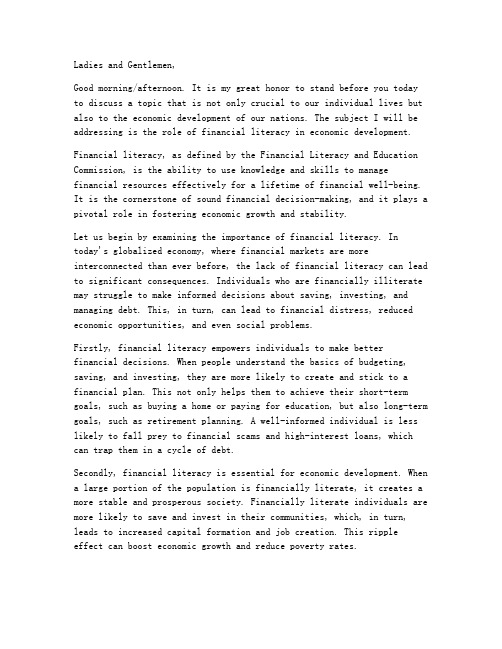
Ladies and Gentlemen,Good morning/afternoon. It is my great honor to stand before you today to discuss a topic that is not only crucial to our individual lives but also to the economic development of our nations. The subject I will be addressing is the role of financial literacy in economic development.Financial literacy, as defined by the Financial Literacy and Education Commission, is the ability to use knowledge and skills to manage financial resources effectively for a lifetime of financial well-being. It is the cornerstone of sound financial decision-making, and it plays a pivotal role in fostering economic growth and stability.Let us begin by examining the importance of financial literacy. Intoday's globalized economy, where financial markets are more interconnected than ever before, the lack of financial literacy can lead to significant consequences. Individuals who are financially illiterate may struggle to make informed decisions about saving, investing, and managing debt. This, in turn, can lead to financial distress, reduced economic opportunities, and even social problems.Firstly, financial literacy empowers individuals to make betterfinancial decisions. When people understand the basics of budgeting, saving, and investing, they are more likely to create and stick to a financial plan. This not only helps them to achieve their short-term goals, such as buying a home or paying for education, but also long-term goals, such as retirement planning. A well-informed individual is less likely to fall prey to financial scams and high-interest loans, which can trap them in a cycle of debt.Secondly, financial literacy is essential for economic development. When a large portion of the population is financially literate, it creates a more stable and prosperous society. Financially literate individuals are more likely to save and invest in their communities, which, in turn, leads to increased capital formation and job creation. This rippleeffect can boost economic growth and reduce poverty rates.Thirdly, financial literacy fosters innovation and entrepreneurship. When individuals understand how to manage their finances, they are more likely to take risks and start their own businesses. This entrepreneurial spirit is a key driver of economic development and can lead to the creation of new industries, products, and services.Now, let us delve into the challenges that hinder the spread offinancial literacy. One of the main challenges is the lack of access to quality financial education. In many countries, particularly in developing regions, there is a lack of resources and infrastructure to provide comprehensive financial education to the general population. This is often compounded by cultural barriers and a lack of awareness about the importance of financial literacy.Moreover, financial literacy is not just about teaching people how to manage their finances; it is also about fostering a mindset of financial responsibility and resilience. This requires a multi-faceted approach, including the development of curricula, the training of educators, and the collaboration between governments, financial institutions, and non-profit organizations.To address these challenges, several initiatives have been launched worldwide. For instance, many countries have introduced financial literacy programs in schools, ensuring that students receive basic financial education at a young age. Additionally, there are numerous online resources, mobile applications, and workshops designed to help adults improve their financial literacy.In conclusion, the role of financial literacy in economic development cannot be overstated. It is a critical factor in achieving financial well-being, fostering economic growth, and reducing poverty. As we move forward, it is imperative that we continue to invest in financial literacy programs and initiatives.Ladies and gentlemen, here are some key points to consider:1. Financial literacy empowers individuals to make informed financial decisions.2. Financial literacy is essential for economic development and stability.3. Financial literacy fosters innovation and entrepreneurship.4. The lack of access to quality financial education is a significant challenge.5. Initiatives such as school programs, online resources, and workshops are essential in promoting financial literacy.In closing, I urge you to take an active role in promoting financial literacy within your communities. Whether you are a teacher, a business leader, or a government official, there are ways to contribute to this noble cause. By doing so, we can create a more financially literate and prosperous world.Thank you for your attention, and I welcome any questions or comments you may have.[End of Speech]。
国际金融英文版

Higher unemployment rate 6.8% (1879 – 1913), 5.6% (1946 – 1990)
Higher cost to maintain the system, in 1990 the cost would be $137 billion.
Limited supply of the gold can hamper the rapid growth of international trade and investment.
Exchange rate were fluctuated over fairly wide ranges because of the predatory devaluation of the domestic currency.
Gold exchange system were adopted. Other countries held gold, U.S. dollars or British pounds as reserves. U.S. and U.K. held gold. U.S. and U.K. traded gold only with foreign central banks, not private citizens.
The exchange rate would fluctuate between (0.80 + 0.008) = 0.8008 and (0.80 – 0.008) = 0.792
0.8008 and 0.792 are called gold export and import points.
Decline of Bretton Woods system
European and Japanese economy grew fast.
金融英语双语阅读三篇
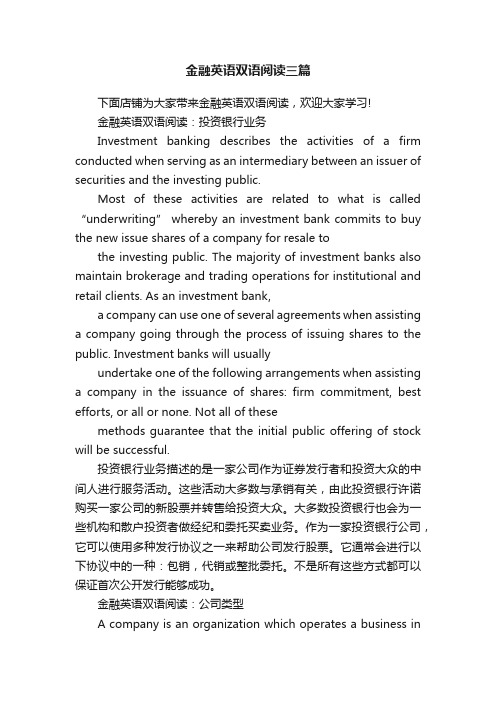
金融英语双语阅读三篇下面店铺为大家带来金融英语双语阅读,欢迎大家学习!金融英语双语阅读:投资银行业务Investment banking describes the activities of a firm conducted when serving as an intermediary between an issuer of securities and the investing public.Most of these activities are related to what is called “underwriting” whereby an investment bank commits to buy the new issue shares of a company for resale tothe investing public. The majority of investment banks also maintain brokerage and trading operations for institutional and retail clients. As an investment bank,a company can use one of several agreements when assisting a company going through the process of issuing shares to the public. Investment banks will usuallyundertake one of the following arrangements when assisting a company in the issuance of shares: firm commitment, best efforts, or all or none. Not all of thesemethods guarantee that the initial public offering of stock will be successful.投资银行业务描述的是一家公司作为证券发行者和投资大众的中间人进行服务活动。
金融英语2011-01

金融英语Unit1 MoneyFiguresAmerican billionaire J. Paul Getty has a very famous saying, that is ― If you can actually count your money, then you are not really a rich man.‖美国的银行业大亨J. Paul Getty曾经说过一句话:如果你的钱是可以数得清楚的,那么你就不是一个真正的富人。
Well, the sentence is interesting, but actually we must know how to count the money before we get rich, especially in English. So, in today’s class, we would first learn to say English numbers. Most people working in finance, whether it is in accountancy, banking, broking, investment, insurance, or whatever, spend a lot of time dealing with numbers.I.0 in English.Usually, we have the following 5 ways to say 0 in English. They are: OH, ZERO, LOVE, NOUGHT, NIL!say ohafter a decimal point 6.03 six point oh threein telephone numbers 84 08 32 13 eight four oh eight three two one threein bus numbers No. 708 get the seven oh eightin hotel room numbers Room 308 I'm in room three oh eight.in years 1905 nineteen oh fivesay noughtbefore the decimal point 0.201 nought point two oh onesay zerofor the number 0 the number zerofor temperature -5~C five degrees below zerosay nilin football scores 5-0 Spain won five nil.say lovein tennis 15- 0 Thescore is fifteen love.1.0.002. (Nought point oh oh two)a)before the decimal point, read nought;b)after a decimal point, read oh.2. Can you get back to me on 010 – 5175 – 0123 ?(Oh one oh five one seven five oh one two three)3. room 804. (Eight oh four)4. it's 20 degrees below 0! (for temperature, say zero.)5. Tennis scoring proceeds from 0 to 15 to 30 to 40 to game.love(0), fifteen(15), thirty(30), forty(40), game (胜局)。
金融文章中英文对照

金融文章中英文对照在现代市场经济中,金融的地位越来越突出,起着很重要的作用。
下面是店铺为大家带来了中英文对照的金融文章,欢迎大海阅读!金融文章中英文对照篇1金融时报双语阅读China should let its currency rise. Such has been the desperate, decade-long complaint from the US and its politicians. China’s manipulation of its currency is a popular scapegoat both for the financial crisis and for the extinction of US manufacturing.An appreciation is plainly in China’s urgent interests. And the rest of the world, including the US, is beginning to grasp that it has reason to fear the consequences if it does. On Wednesday and Thursday of this week, China’s authorities at one point allowed the renminbi to appreciate against the dollar by a greater percentage than in any two-day period since its managed rise first started in 2005. These moves remain tiny; but they combine with official criticism of the US, a growing need to combat Chinese inflation and much Chinese commentary favouring a change of policy to suggest that the renminbi may soon be allowed to take flight. A widening of its trading bands might be a first incremental step.Unlike the first managed appreciation, from 2005 to 2008, the current “appreciation” has done nothing to help domestic inflation. By tying to the dollar, a currency sinking like a stone, the renminbi has depreciated against all currencies on a trade-weighted basis, JPMorgan data show. A drastic shift is needed. That will mean exporting its inflation. It also means buying fewer treasuries, or even selling some, which would in turn counteractany efforts at “quantitative easing” – buying bonds to keep US yields low.The dollar would probably tumble, and treasury yields rise. Other effects are less clear. The Australian dollar, long a proxy for Chinese growth, might suffer if China slows, as might other commodity-driven currencies but much depends on China’s own decisions.China’s external reserves are enough, even at current prices, to buy all the gold ever produced. It will be hard to shift policy without causing a big displacement elsewhere in the world. Correcting this global imbalance may be necessary but it will not be easy.Lex专栏:美国担心人民币升值?中国应该让人民币升值——美国及其政界人士为此声嘶力竭地抱怨了10年。
金融英语 chapter 1 money
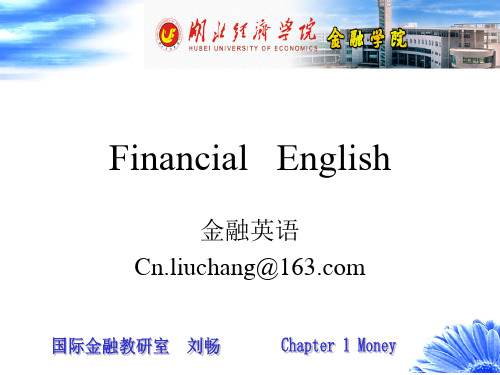
Course Structure
• Chapter 1 Money, the Functions of Money and the Financial System • Chapter 2 The Banking system • Chapter 3 Interest Rate and Interest Rate Policies • Chapter 4 Money Market
• 铸币税(Seigniorage) • 也称为“货币税”。发行货币的组织或 国家的政府可以不需任何补偿地用纸制 货币向自己的居民换取实际经济资源, 从中攫取发行货币所产生的特定收益。 这部分由货币发行主体垄断性地享受 “通货币面价值超出生产成本”的收益, 就被定义为“铸币税”。Professional源自TermsQuestion
• When you buy a pair of jeans or a CD, for example, you never wonder whether the merchant will accept the bills and coins in your wallet as payment. • But suppose money didn't exist. How would you pay for the things you want to buy?
• 45.fund obligation基金负担
• 基金负担或称基金总数是指当时发行在 外的基金的总量
Professional Terms
• 58.monetary ease银根松动 • 银根monetary situation 指金融市场上的 资金供应。因中国1935年法币改革以前 曾采用银本位制,市场交易一般都用白 银,所以习惯上称资金供应为银根。 • 银根有紧松之分,判断依据是资金供需 状况。如果市场上资金供不应求,称为 “银根紧俏”或“银根紧”;市场上资 金供过于求,称为“银根松疲”或“银 根松”
金融英语(句子)全

Chapter One Functions of Financial Markets1.Most key State-owned enterprises(SOE) have been restructured into corporations, anda considerable number of them listed on domestic and overseas stock markets.大多数国有重点企业进行了公司制改革,其中相当一部分在境内或境外上市。
2.We should continue to deepen financial reform, rectify financial order, tightenfinancial supervision and regulation by law and improve performance.深化金融改革,整顿金融秩序,强化金融监管和法制,提高经营效益。
3.Where a bill of exchange is drawn payable at a fixed period after sight, the holdershall present the bill to the drawee for acceptance within one month after the date of issue.见票后定期付款的汇票,持票人应当自出票日起一个月内向付款人提示承兑。
4.Securities service organizations are organizations which are legally established andengage in securities-related services, including law firms, accounting firms, consultancy firms, credit rating agencies and asset appraisal agencies 证券服务机构是依法成立,并提供证券相关服务的机构。
金融英语Lecture1Money

金融英语Lecture1MoneyMoneyIf you can actually count your money, then you are not really a rich man.——American oil billionaire J. Paul GettyWhat is money?Economists define money as anything that is generally accepted in payment for goods or services or in the repayment of debts.Types of moneyA. Commodity moneyB. Convertible paper moneyC. Fiat money(or fiat currency):Usually paper money, is a type of currency whose only value is that a government made a fiat that the money is a legal method of exchange.Unlike commodity money or representative money it is not based in another commodity such as gold or silver and is not covered by a special reserve.D. Private debt moneyE. Electronic moneyPrivate debt moneyA loan that the borrower promises to repay in currency on demand.E.g. IOU the checkable deposit at commercial banks and other financial institutions.Commercial notes(商业票据):Short-term, unsecured, discounted, and negotiable notes sold by one company to another in order to satisfy immediate cash needs.Include: promissory note (期票,拮据) draft (汇票) check and so on. Electronic money: Electronic Check, Internet Payment System, Credit Card ServiceWhat does money do?A. Medium of ExchangeIn almost all market transactions in our economy, money in the form of currency or checks is a medium of exchange; it is used to pay for goods and services. The use of money as a medium of exchange promotes economic efficiency by eliminating much of the time spent in exchanging goods and services.Terms: Transaction cost, Time value of moneyB. Unit of AccountThe second role of money is to provide a unit of account; that is, it is used to measure value in the economy. We measure the value of goods and services in terms of money, just as we measure weight in terms of pounds or distance in terms of miles.Note: Fiat money has not only no particular value in use; it doesn't even really have a value in exchange except that which is decreed that it would have.Terms: Good money, Bad moneyC. Store of ValueMoney also functions as a store of value: it is a repository of purchasing power over time. It is an asset. It 's something that we can use to store value away to be retrieved at a later point in time. So we can not consume today, we can hold money instead - and transfer that consumption power to some point in the future.Term: Hard currencyMeasuring Monetary Aggregates1. Measure as “money” only those assets that are most liquid, hence that function best as a medium of exchange.2. Include all financial assets in the measure of money, but weight them in proportion to their liquidity.1. M1 = Most Narrow Measure (Most Liquid)M1 = currency + traveler’s checks + demand deposits + other checkable deposits2. M2 = M1 + Less Liquid AssetsM2 = M1 + small denomination time deposits + savings deposits + money market deposit accounts + money market mutual fund shares3. M3 = M2 + Less Liquid AssetsMoney supplyThe revenue raised through the printing of money. When the government prints money to finance expenditure, it increases the money supply. The increase in the money supply, in turn, causes inflation. Printing money to raise revenue is like imposing an inflation tax.To expand the money supply:The Federal Reserve buys Treasury Bonds and pays for them with new money.To reduce the money supply:The Federal Reserve sells Treasury Bonds and receives the existing dollars and then destroys them.InflationInflation is an increase in the average level of prices, and a price is the rate at which money is exchanged for a good or service.Here is a great illustration of the power of inflation:In 1970, the New York Times cost 15 cents, the median price of a single-family home was $23,400, and the average wage in manufacturing was $3.36 per hour. In 2008, the Times cost $1.50,the price of a home was $183,300, and the average wage was $19.85 per hour.Hyperinflation is defined as inflation that exceeds 50 percent per month, which is just over 1 percent a day.Questions1. Money is not unique as a store of value; any asset, be it money, stocks, bonds, land, houses, art, or jewelry, can be used to store wealth.Many such assets have advantages over money as a store of value: They often pay the owner a higher interest rate than money, experience price appreciation, and deliver services such as providing a roof over one's head. If these assets are a more desirable store of value than money, why do people hold money at all?The answer to this question relates to the important economic concept of liquidity.2. Rank the following assets from most liquid to least liquid:a.Checking account depositsb. Housesc. Currencyd. Washing machinese. Savings depositsf. Common stock3. Why have some economists described money during a hy perinflation as a “hot potato” that is quickly passed from one person to another?4. Was money a better store of value in the United States in the 1950s than it was in the 1970s? Why or why not? In which period would you have been more willing to hold money?5. In Brazil, a country that was undergoing a rapid inflationbefore 1994, many transactions were conducted in dollars rather than in Reals, the domestic currency. Why?Quiz1. Fiat money is:A. credit card chargesB. CoinsC. not convertible into precious metals.D. checksAnswer: C2. Which of these is not a function of money in an economy?A. Store of valueB. Medium of exchangeC. Source of incomeD. Unit of account Answer:C3. Which of the following is not part of M1?A. checking accountsB. traveler's checksC. savings accountsD. currency Answer:C4. If Mary deposits $100 of her currency in her checking account, then:A. M1 will increase by $100.B. M2 will fall by $100.C. M1 and M2 will not change.D. M2 will increase by $100. Answer:C5. If Mary moves $100 from her savings account to her checking account, then:A. M1 will not change.B. M2 will not change.C. M1 will fall by $100.D. M2 will fall by $100. Answer:B6. Which of the following is not part of M2?A. Small time depositsB. CurrencyC. Institutional money market mutual fundsD. Saving accounts Answer:C7. Inefficiencies that are created when using checks as money include:A. Checks can transfer funds slowly.B. There are too many bad checks written.C. Checkbooks can be stolen.D. Checks can be written for any amount.Answer:A8. The liquidity of an asset is:A. the ability of an asset to earn interest income.B. the amount of an asset sold at discount or premium.C. the relative ease with which an asset can be converted into a medium of exchange.D. the relative ease with which an asset can be converted into a common stock.Answer:C9. For a commodity to function effectively as money, it mustA. Be widely accepted.B. Be backed by gold or silver.C. Be indestructible.D. Be printed by the government. Answer:A10. Money supply data is generated by:A. The Department of CommerceB. The Federal Deposit Insurance Corporation (FDIC)C. The Federal Reserve System (the Fed)D. The Treasury DepartmentAnswer:C11. Which of the following correctly shows the evolution of the payments system?A. Commodity money, fiat money, checks, electronic money.B. Commodity money, fiat money, electronic money, checks.C. Commodity money, checks, fiat money, electronic money.D. Fiat money, commodity money, checks, electronic money. Answer:A12.Which of the following is true regarding money's store of value function?A. money does not allow a person to hold purchasing power from the time income is earned until it is spent.B. money is the only store of value available.C. money is the most liquid store of value available.D. money is superior to all other stores of value during periods of inflation.Answer:C13. Which of the following is not a disadvantage of electronicmoney?A. People are concerned about the privacy and security of e-money transactions.B. E-money transactions cost more than paper check transactions.C. The cost of setting up a system for processing e-money payments is high.D. E-money does not allow people to take advantage of float. Answer:B14. Wealth isA. Generally accepted for the repayment of debtsB. A flow of earnings per unit of timeC. A stock conceptD. The total collection of pieces of property that serve to store value Answer:D15. The Fed's measurements of monetary aggregatesA. Are more reliable in the short run than the long run.B. Are revised once a year.C. Does not depend on the definition of money.D. Are more reliable in the long run than the short run.Answer:D。
金融英语范文

金融英语范文The Role of Finance in Global Economic DevelopmentFinance, the lifeblood of any economy, plays a pivotal role in driving global economic development. It encompasses a vast array of activities, including capital raising, investment, risk management, and the provision of financial services. In today's interconnected world, the importance of finance in shaping the global economy cannot be overstated.Capital raising is a crucial aspect of finance. It involves the process of gathering funds from various sources, such as individuals, institutions, and governments, to finance economic activities. The efficient allocation of these funds to projects that offer the highest return on investment is vital for economic growth. Finance markets, such as stock exchanges and bond markets, facilitate this process by providing a platform for investors and borrowers to come together and transact.Investment is another crucial aspect of finance. It involves the deployment of funds into productive assets that generate income or appreciation in value. Investments can take various forms, including equity, debt, real estate, and alternativeassets. Finance professionals analyze and evaluate investment opportunities to determine their risk and return potential, enabling investors to make informed decisions.Risk management is an integral part of finance. It involves the identification, assessment, and mitigation of risks that could potentially affect the financial health of individuals, businesses, and economies. Finance professionals use various tools and techniques, such as derivatives and hedging strategies, to manage risk and minimize its impact on financial performance.The provision of financial services is another crucial aspect of finance. These services, such as banking, insurance, and asset management, facilitate economic transactions and protect individuals and businesses from financial risks. The efficient delivery of these services is crucial for economic development, as it enables businesses to operate smoothly and individuals to manage their financial affairs effectively.In conclusion, finance plays a crucial role in driving global economic development. It enables the efficient allocation of capital, facilitates investment, manages risk, and provides essential financial services. As the global economy continuesto evolve and integrate, the importance of finance in shaping its future cannot be ignored.。
金融英语作文

金融英语作文Financial markets are the backbone of modern economies, providing a platform for the exchange of capital and investment opportunities. In this essay, we will delve into the intricacies of financial English, which is essential for anyone involved in the world of finance.Understanding Financial TerminologyTo begin with, financial English is replete with jargon that can be daunting for newcomers. Terms such as "equity," "bonds," "derivatives," "IPO," and "forex" are common and must be understood to navigate the markets effectively.- Equity refers to ownership in a company, often represented by shares or stocks, which can be traded on stock exchanges. - Bonds are debt instruments issued by corporations or governments to raise capital, promising to pay interest over a set period and repay the principal at maturity.- Derivatives are financial contracts whose value is derived from the value of an underlying asset, such as commodities, stocks, or currencies.- IPO (Initial Public Offering) is the process by which a private company goes public, offering its shares to the public for the first time.- Forex (Foreign Exchange) is the global market where currencies are traded.The Role of Financial InstitutionsFinancial institutions play a critical role in facilitating transactions and managing risk. Banks, investment firms, and insurance companies are key players in the financial ecosystem.- Banks provide loans, accept deposits, and offer various financial services to individuals and businesses.- Investment firms manage portfolios and offer advice on investment opportunities.- Insurance companies provide protection against financialloss by pooling risk and providing coverage for various events.Financial StatementsFinancial statements are the lifeblood of financial analysis. They include:- Balance Sheet: A snapshot of a company's financial position, showing assets, liabilities, and equity at a specific pointin time.- Income Statement: A report showing a company's revenues, expenses, and net income over a period.- Cash Flow Statement: A record of cash inflows and outflows, providing insight into a company's liquidity.Market AnalysisMarket analysis is crucial for making informed investmentdecisions. Investors use various tools and techniques:- Fundamental Analysis involves evaluating a company's financial health and performance to determine its intrinsic value.- Technical Analysis uses historical price data and trading volume to predict future price movements.- Macroeconomic Analysis considers broader economic factors that can affect financial markets, such as interest rates, inflation, and GDP growth.Ethical ConsiderationsThe world of finance is not without its ethical challenges. Issues such as insider trading, market manipulation, and conflicts of interest must be addressed to maintain trust and integrity in the markets.- Insider Trading is illegal and involves trading on non-public information.- Market Manipulation is the act of artificially inflating or deflating the price of a security.- Conflicts of Interest can arise when a financial professional's personal interests conflict with their duty to their clients.ConclusionMastering financial English is a critical step in understanding and participating in the financial markets. It requires a solid grasp of terminology, knowledge of financialinstitutions, the ability to interpret financial statements, and the skills to analyze markets. Moreover, maintaining ethical standards is paramount to ensure the health and stability of the financial system. As the global economy becomes increasingly interconnected, the importance of financial literacy and integrity cannot be overstated.。
金融英语-1-Basics
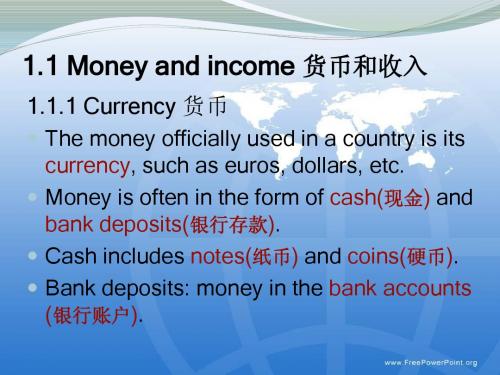
1.2 Business finance 公司财务
1.2.1 Capital 资本
Capital is the money used to set up (建立) or start a company. Companies can borrow (借入) this money, called a loan (借款), from banks. The loan must be paid back (偿还) with interest (利息). Capital can also come from issuing shares or equities (股票) -certificates representing units of ownership (所有权).
Outgoing 开支
Amounts of money that people have to spend regularly are outgoings, which include: Living expenses (日常开支 : money spent on 日常开支) 日常开支
everyday needs such as food, clothes and public transport. Bills (账单 requests for the payment of money 账单): 账单 owed for services such as electricity, gas and telephone connections. Rent (租金 money paid for the use of a house 租金): 租金 or flat. Mortgage (贷款 repayments of money 贷款): 贷款 borrowed to buy a house or flats. Health insurance (人身保险 , tax (税收 …… 人身保险) 税收): 人身保险 税收
金融英语 作文
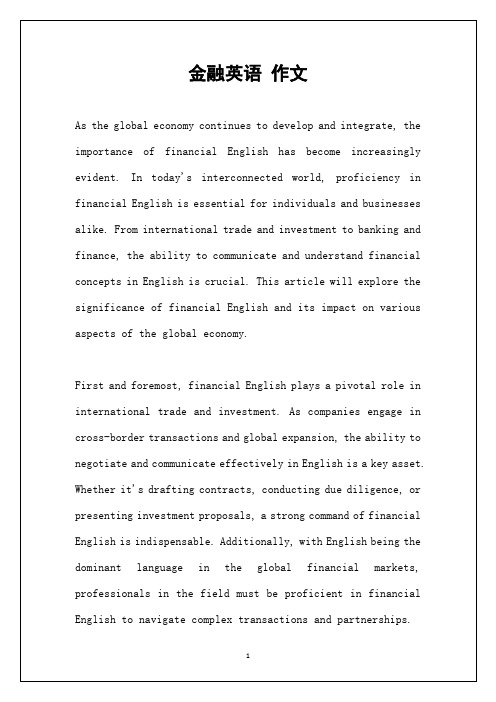
Furthermore, the impact of financial English is not limited to professionals in the field; it also has broader implications for society as a whole. With a growing emphasis on financial literacy and education, the ability to comprehend and communicate financial concepts in English is vital. Whether it's understanding investment products, managing personal finances, or making informed decisions, individuals benefit from being proficient in financial English. Moreover, access to English-language financial resources and materials enables greater inclusivity and access to financial knowledge for a global audience.
金融英语翻译范文29篇
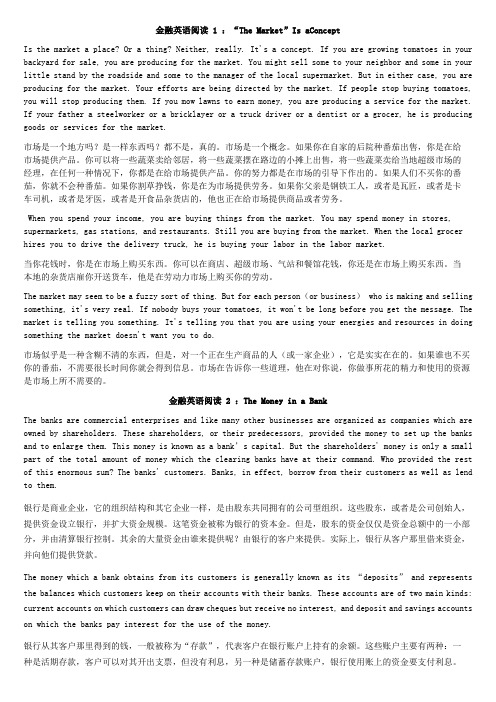
金融英语阅读 1 :“The Market”Is aConceptIs the market a place? Or a thing? Neither, really. It's a concept. If you are growing tomatoes in your backyard for sale, you are producing for the market. You might sell some to your neighbor and some in your little stand by the roadside and some to the manager of the local supermarket. But in either case, you are producing for the market. Your efforts are being directed by the market. If people stop buying tomatoes, you will stop producing them. If you mow lawns to earn money, you are producing a service for the market. If your father a steelworker or a bricklayer or a truck driver or a dentist or a grocer, he is producing goods or services for the market.市场是一个地方吗?是一样东西吗?都不是,真的。
市场是一个概念。
如果你在自家的后院种番茄出售,你是在给市场提供产品。
你可以将一些蔬菜卖给邻居,将一些蔬菜摆在路边的小摊上出售,将一些蔬菜卖给当地超级市场的经理,在任何一种情况下,你都是在给市场提供产品。
金融英语chapter 1
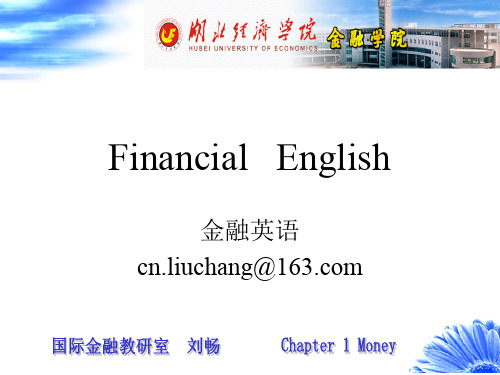
• —Money is a stock: it is a certain amount at a given point in time.
Additional question
• What is difference between revenue and income?
— Fiat money has not only no particular value in use; it doesn’t even really have a value in exchange except that which is decreed that it would have.
Turnover of funds slow
Exchange for GBP1,250.00 Beijing,1 April,2003
At sight pay to the order of DEF Co.the sum
of Pounds one thousand two hundred and fifty only
To XYZ Bank,
For ABC Co., Beijing
London
(signature)
End of 18 century
Foreign exchange bank
Evolution of Money
• Paper currency (fiat money) ( intrinsically worthless)
Medium of exchange
• Money is therefore essential in an economy it is a lubricant that allows the economy to run more smoothly by lowering transaction costs, thereby encouraging specialization and the division of labor.
chapter 1 金融英语阅读
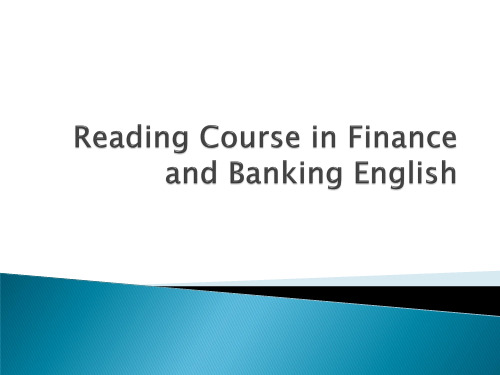
Fiscal agent 财政代理
An organization, such as a bank or trust company, that takes responsibility for the fiscal duties of an unrelated party. Here the central bank acts as an agent empowered to collect taxes, revenues, and duties on behalf of the government.
Foreign exchange reserves 外汇储备
Foreign exchange reserves are the foreign currency deposits held by national banks of different nations. These are assets of Governments which are held in different hard currencies such as Dollar, Sterling, Euro and Yen.
2. PBC is duly authorized to manage monetary base, control aggregate credit and adjust benchmark interest rates as well as issue currency.
译:中国人民银行掌握货币发行权、基础货币管理权、 信用总量调控权和基准利率调节权。
Lending facilities 贷款工具
3.Placing priority on both economic efficiency and social benefits, the policy banks operate in their designated areas and are not expected to compete with commercial banks. Their basic operational financial goal is to break even and only to make small profits when conditions allow.
金融英语演讲稿
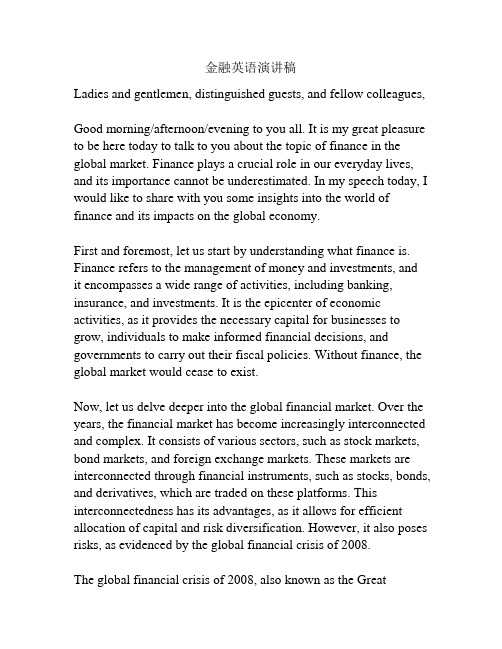
金融英语演讲稿Ladies and gentlemen, distinguished guests, and fellow colleagues,Good morning/afternoon/evening to you all. It is my great pleasure to be here today to talk to you about the topic of finance in the global market. Finance plays a crucial role in our everyday lives, and its importance cannot be underestimated. In my speech today, I would like to share with you some insights into the world of finance and its impacts on the global economy.First and foremost, let us start by understanding what finance is. Finance refers to the management of money and investments, and it encompasses a wide range of activities, including banking, insurance, and investments. It is the epicenter of economic activities, as it provides the necessary capital for businesses to grow, individuals to make informed financial decisions, and governments to carry out their fiscal policies. Without finance, the global market would cease to exist.Now, let us delve deeper into the global financial market. Over the years, the financial market has become increasingly interconnected and complex. It consists of various sectors, such as stock markets, bond markets, and foreign exchange markets. These markets are interconnected through financial instruments, such as stocks, bonds, and derivatives, which are traded on these platforms. This interconnectedness has its advantages, as it allows for efficient allocation of capital and risk diversification. However, it also poses risks, as evidenced by the global financial crisis of 2008.The global financial crisis of 2008, also known as the GreatRecession, had far-reaching implications on the global economy. It started with the collapse of Lehman Brothers, one of the biggest investment banks in the United States. This event triggered a chain reaction, leading to a severe credit crunch and a worldwide recession. The crisis highlighted the vulnerabilities of the global financial system and the need for better regulations and risk management practices. Governments and central banks stepped in with massive bailout packages and monetary stimulus measures to stabilize the system. Lessons were learned, and reforms were made to prevent a similar crisis from happening again.One of the key takeaways from the financial crisis is the importance of financial literacy. Financial literacy refers to the ability to understand and make informed financial decisions. It empowers individuals to manage their own finances, make prudent investments, and protect themselves from financial frauds and scams. Unfortunately, financial literacy is still lacking in many parts of the world. This is evident in the high levels of personal debt, inadequate retirement savings, and a lack of understanding of basic financial concepts. It is crucial for individuals, educational institutions, and governments to promote financial literacy and equip people with the necessary knowledge and skills to navigate the complex world of finance.Furthermore, the global financial market is also facing new challenges and opportunities in the digital age. Technological advancements, such as artificial intelligence, blockchain, and fintech, are revolutionizing the way financial services are delivered. These technologies have the potential to make financial services more efficient, transparent, and accessible to all. However, theyalso pose risks, such as cybersecurity threats and the displacement of traditional jobs. It is therefore important for regulators and industry players to strike a balance between innovation and risk management to ensure the stability and integrity of the financial system.In conclusion, finance is the lifeblood of the global economy. It provides the necessary capital for businesses to grow, individualsto make informed financial decisions, and governments to carry out their fiscal policies. The global financial market is interconnected and complex, and it requires better regulations, risk management practices, and financial literacy to ensure its stability and efficiency. The digital age is bringing new opportunities and challenges to the financial sector, and it is crucial for regulators and industry players to adapt to these changes. Let us embrace the power of finance and work together to build a more stable, inclusive, and sustainable financial system for all.Thank you for your attention and for giving me the opportunity to share my thoughts on this important topic.Certainly! Here are some additional points and ideas you can consider when expanding on the topic of finance in the global market:1. The role of central banks: Central banks, such as the Federal Reserve in the United States and the European Central Bank, play a crucial role in the global financial market. They are responsible for setting monetary policy, controlling interest rates, and ensuring the stability of the financial system. The actions and decisions of central banks have a significant impact on the global economy, as they influence borrowing costs, inflation levels, and exchange rates.2. Global financial institutions: Global financial institutions, such as the International Monetary Fund (IMF) and the World Bank, also play a key role in the global financial market. These institutions provide financial assistance, loans, and technical expertise to countries facing financial difficulties. They promote economic stability, poverty reduction, and sustainable development through their programs and initiatives.3. International trade and finance: Finance is closely intertwined with international trade. Trade finance provides the necessary funding for cross-border transactions and enables businesses to mitigate risks associated with international trade. Trade finance products, such as letters of credit and export credit insurance, facilitate global trade flows and support economic growth.4. Foreign exchange market: The foreign exchange market, also known as the forex market, is the largest and most liquid financial market in the world. It facilitates the exchange of currencies between participants, such as commercial banks, central banks, and multinational corporations. Exchange rates have a significant impact on international trade, capital flows, and investment decisions. The forex market is influenced by various factors, including economic indicators, geopolitical events, and investor sentiment.5. Sustainable finance: In recent years, there has been increasing attention on sustainable finance and responsible investment practices. Sustainable finance refers to financial services and products that integrate environmental, social, and governance(ESG) factors into investment decision-making. It aims to promote long-term value creation, address environmental and social challenges, and support the transition to a more sustainable economy. This includes areas such as green bonds, impact investing, and socially responsible investing.6. Financial inclusion: Despite the advancements in the global financial market, there are still many individuals and communities that lack access to basic financial services. Financial inclusion refers to the efforts to provide affordable and accessible financial services to the unbanked and underserved populations. This includes initiatives such as mobile banking, microfinance, and community-based financial institutions. Enhancing financial inclusion can promote economic growth, reduce poverty, and empower individuals to improve their livelihoods.7. The role of regulation: The global financial market is heavily regulated to ensure its stability, integrity, and fair practices. Regulatory bodies, such as the Securities and Exchange Commission (SEC) in the United States and the Financial Conduct Authority (FCA) in the United Kingdom, set rules and standards for financial institutions and market participants. These regulations aim to protect investors, maintain market confidence, and prevent financial crises. However, striking the right balance between regulation and innovation is essential to avoid stifling growth and innovation in the financial sector.8. The impact of financial crises: Financial crises, such as the Great Depression of the 1930s and the Asian Financial Crisis of 1997, have had profound impacts on the global economy. Theyresult in severe economic contractions, high unemployment rates, and social unrest. These crises are often triggered by excessive risk-taking, inadequate regulations, and unsustainable debt levels. Learning from past crises and implementing effective risk management practices can help prevent and mitigate future financial crises.9. Corporate governance: Good corporate governance is essential in ensuring the proper functioning of financial markets. It provides transparency, accountability, and integrity in corporate decision-making, especially in publicly traded companies. Effective corporate governance practices help protect the interests of shareholders, foster investor confidence, and enhance long-term value creation.10. The future of finance: The world of finance is continuously evolving, driven by technological advancements, changing consumer behaviors, and global economic trends. The future of finance might include advancements in fintech, digital currencies, and decentralized finance (DeFi). These changes have the potential to revolutionize the way financial services are delivered, making them more efficient, secure, and accessible. However, they also come with new risks and challenges that need to be addressed. These are just a few additional points to consider when expanding on the topic of finance in the global market. Remember to provide examples, statistics, and case studies to support your arguments and make your speech more engaging and informative.。
金融行业英语演讲稿范文

Ladies and Gentlemen,Good morning/afternoon/evening. It is a great pleasure to stand before you today to discuss a topic that is at the heart of our times – the future of the finance industry. As we navigate through the complexities of the digital age, it is imperative that we understand the transformations taking place and the opportunities they present. In this speech, I will explore the key trends shaping the financial landscape, the challenges they bring, and the strategies that financialinstitutions can adopt to thrive in this evolving environment.I. The Digital Revolution in FinanceThe digital revolution has already transformed numerous industries, and the finance sector is no exception. The advent of technology has brought about unprecedented innovation, reshaping the way we manage our finances, invest, and transact. Here are some of the key trends:A. Fintech DisruptionFinancial technology, or Fintech, has disrupted traditional banking models by introducing innovative solutions that cater to the needs ofthe modern consumer. Mobile banking, peer-to-peer lending, and robo-advisors are just a few examples of how Fintech has changed the game.B. Blockchain and CryptocurrencyBlockchain technology, the backbone of cryptocurrencies like Bitcoin, is poised to revolutionize the financial industry. Its ability tofacilitate secure, transparent, and decentralized transactions has sparked a global debate on the future of money and finance.C. Artificial Intelligence and Machine LearningAI and machine learning are transforming the way financial institutions operate. These technologies can analyze vast amounts of data to identify patterns, predict market trends, and personalize financial services for customers.II. Challenges and RisksWhile the digital revolution has brought about numerous benefits, it also presents several challenges and risks:A. Cybersecurity ThreatsAs financial institutions become more digital, they are increasingly vulnerable to cyber attacks. The risk of data breaches, fraud, and theft has never been higher, and financial institutions must invest in robust cybersecurity measures to protect their customers and their own assets.B. Regulatory ComplianceThe rapid pace of technological change has outpaced the ability of regulators to keep up. Financial institutions must navigate a complex web of regulations, which can be both costly and time-consuming to comply with.C. Ethical ConcernsThe use of AI and machine learning raises ethical questions regarding transparency, accountability, and the potential for bias in decision-making processes.III. Strategies for SuccessTo thrive in this digital landscape, financial institutions must adopt a proactive approach to innovation and change management. Here are some strategies that can help:A. Embrace Fintech PartnershipsCollaborating with Fintech startups can provide financial institutions with access to innovative solutions and new markets. By partnering with Fintech companies, institutions can enhance their offerings and stay competitive.B. Invest in Technology and TalentTo leverage the power of digital technology, financial institutions must invest in the right technology infrastructure and recruit skilled professionals who can drive innovation and lead change.C. Focus on Customer ExperienceIn a digital world, the customer experience is paramount. Financial institutions must prioritize customer satisfaction by offering seamless, personalized, and secure services.D. Foster a Culture of InnovationCreating a culture that encourages innovation is essential for long-term success. Financial institutions should foster an environment where employees feel empowered to experiment, take risks, and learn from their experiences.IV. ConclusionThe future of the finance industry is undeniably digital. As we navigate the challenges and risks that come with this transformation, it is crucial that we remain agile, open to change, and focused on delivering value to our customers. By embracing the digital wave, financial institutions can not only survive but thrive in this new era of finance.Thank you for your attention, and I look forward to any questions or discussions you may have on this fascinating topic.[End of Speech]。
- 1、下载文档前请自行甄别文档内容的完整性,平台不提供额外的编辑、内容补充、找答案等附加服务。
- 2、"仅部分预览"的文档,不可在线预览部分如存在完整性等问题,可反馈申请退款(可完整预览的文档不适用该条件!)。
- 3、如文档侵犯您的权益,请联系客服反馈,我们会尽快为您处理(人工客服工作时间:9:00-18:30)。
金融英语原文
A Guide To Loan Payment Protection Insurance
Loan payment protection insurance can be taken out at the time of borrowing, lenders will in fact try to push the cover with their loans to grab back profits and make up for the cheap loan. Of course this is one of the dearest ways of protecting the money you are borrowing against the fact that you might be unable to work due to an accident or sickness. It would also provide you with an income if you should become unemployed due to redundancy.
So when taking on a loan or credit card always make sure that you choose to cover the borrowing by buying it independently. High street lenders at one point would sometimes add cover onto the borrowing without you being aware of what you were taking on. However for the most part this has changed since the intervention by the Financial Services Authority. It is always worthwhile making sure that it hasn't been added onto the loan you are taking out.
Policies taken with a standalone provider are one of the cheapest ways to protect your borrowing and in order to get the cheapest loan payment protection insurance quote you have to compare with several providers. The premium that is charged for the protection is based on the amount that you wish to cover each month up to a certain amount and your age. Age based insurance makes payment protection products affordable for all. The amount you insure against is what you would receive if you should become incapacitated or unemployed. You can protect not only your loan repayments but also any credit card debts you have. As more and more people turn to using "plastic" to get by, covering your borrowings is essential.
When the policy would payout and for how long would all depend on the provider you chose to go with. Therefore it is essential to read the small print
of the policy before taking it out. Some providers will offer a policy that begins paying out a tax-free sum after just 30 days. However some will defer paying out on the policy until you have at least been out of work or unemployed for 90 days. The same applies as to how long the cover would last. There are policies that could payout for 12 months and some providers offer cover lasting up to 24 months. You also have to look at the exclusions as there are some in all policies and how many depends on the provider.
Loan payment protection insurance is valuable as if you cannot maintain your repayments and get behind and into debt then at the very least you would see your credit rating affected. In the worse cases you would be given a County Curt Judgement and bailiffs may be sent to recover what you owed through your belongings. Of course with a loan payment protection plan behind you, you would not have this worry and would be able to continue meeting your repayments. This alone would give you peace of mind and at a time when you need to be concentrating on making a recovery or going out and finding work, it is a lifeline.
(Kjkimberly)。
